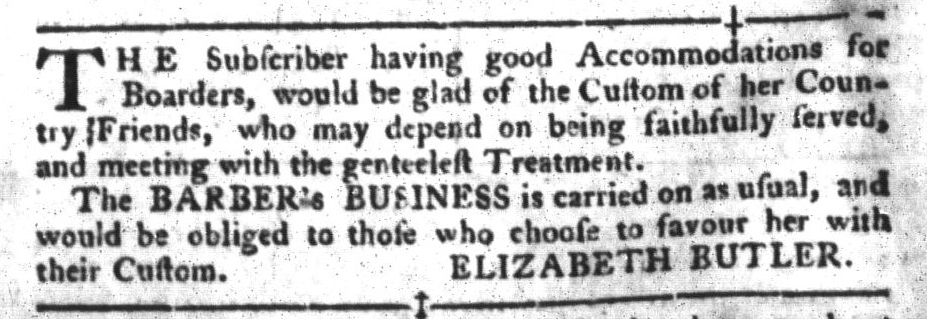What was advertised in a colonial American newspaper 250 years ago today?

“The BARBER’s BUSINESS is carried on as usual.”
Elizabeth Butler’s advertisement in the July 19, 1768, edition of the South-Carolina Gazette and Country Journal demonstrates that women pursued a wide range of occupations in colonial America. Divided into two parts, Butler’s advertisement promoted two different services she provided. In the first portion, she announced that she had “good Accommodations for Boarders” who could “depend on being faithfully served, and meeting with the genteelest Treatment.” Women throughout the colonies provided such services. In that regard, Butler did not describe anything out of the ordinary. In the second portion of her advertisement, however, Butler indicated that she practiced an occupation usually reserved for men: shaving and trimming beards as well as cutting and dressing hair. “The BARBER’s BUSINESS is carried on as usual,” Butler informed prospective clients, apparently reminding many readers of the services that she apparently had already provided for some time.
When women placed newspaper advertisements for the services they provided they also indicated what was probable and what was possible for members of their sex in the marketplace. Most advertisements fell in the category of what was probable, such as those placed by milliners, schoolmistresses, and women who took in boarders. A significantly smaller number of advertisements, on the other hand, belonged to the category of what was possible. Women sometimes practiced trades considered the domain of men, such as barbering. Butler’s advertisement testifies to the flexibility sometimes exhibited in the gendering of occupations in colonial America. While women did not enter most trades in large numbers, a few did manage to carve out space for themselves without being too disruptive of social norms. They did so by remaining exceptions to expectations rather than seeking to transform generally accepted ideas about who should work in particular occupations. That Butler simultaneously pursued an occupation considered appropriate for women – operating a boardinghouse – may have reassured residents of Charleston that she sought only to stretch rather than shatter the gendered boundaries associated with barbering.
